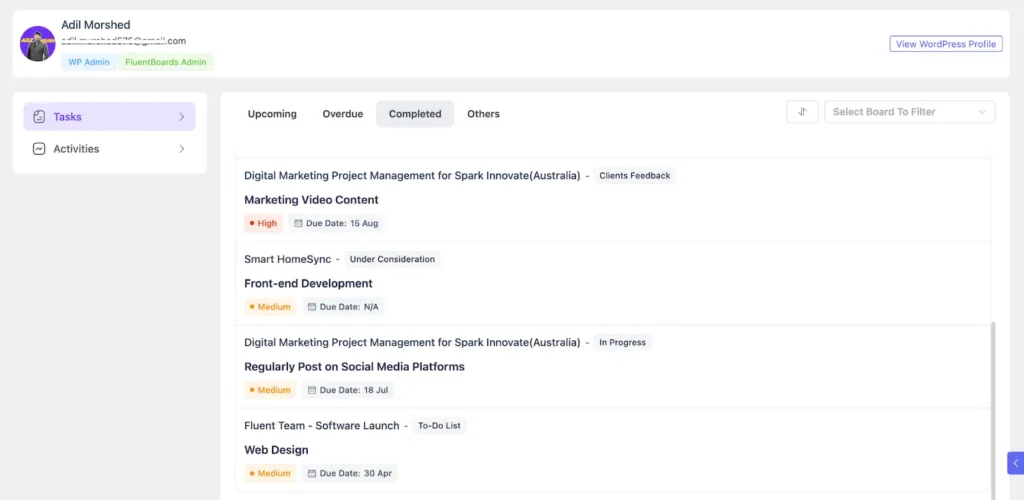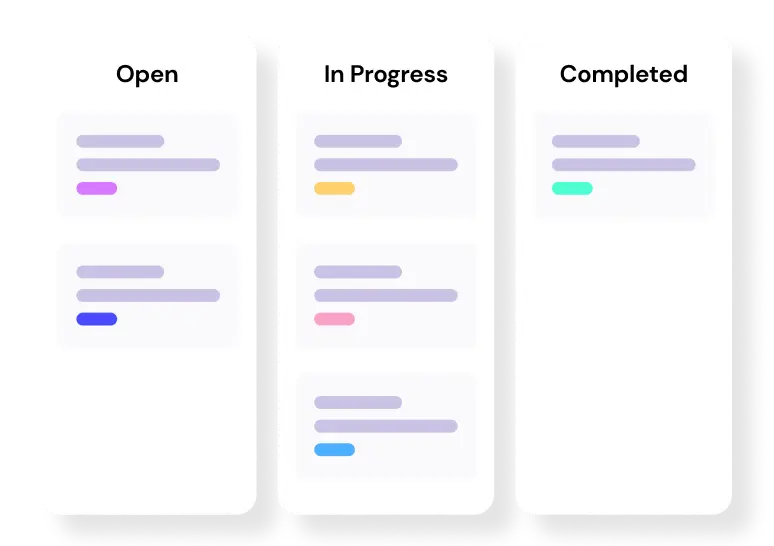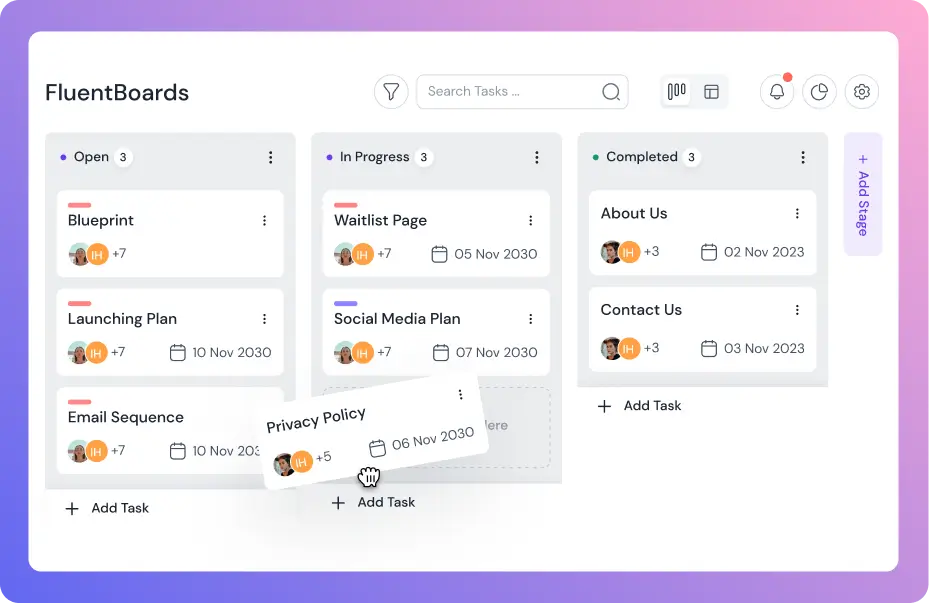
Team Management in Project Management: How to Manage a Project Team Effectively?
Who wouldn’t want a team that’s both happy and productive?
But as you know, turning expectations into reality always requires significant effort, and when it comes to managing a project team effectively, the challenge becomes even greater!
Every team member brings their unique traits, quirks, strengths, and weaknesses to the table. And as the “captain of the ship,” the project manager, it’s your responsibility to connect all these dots and create an environment where everyone flourishes and excels seamlessly.
By the way, are you here searching for strategies to make it easier??
Well, you’re in the right place! In this blog, we’ll share tips to help you manage your project team and confidently navigate tough times.
So, what are you waiting for? Grab the wheel, get ready, and read on!
Team Management in Project Management
Team management in project management is about working together with project teams to ensure productive collaboration and the achievement of a targeted goal.
In other words, managing a project team is about working together as a cohesive unit, not just as individuals with well-defined roles and responsibilities in project. It involves aligning everyone’s unique skill sets within the right team structure to achieve project success
However, managing a project team comes with its own set of challenges. While challenges in project management can vary significantly from one team to another, here are some of the most common ones project teams encounter:
- Miscommunication leads to confusion and mistakes
- Unresolved conflicts disrupt progress
- Lack of accountability affects deadlines
- Differing priorities cause disengagement
- Uneven workload, with some feeling overwhelmed
As the project manager, it’s your responsibility to address these challenges and guide your project toward success. Like the captain of a ship, you must take charge and take responsibility for:
- Planning: Defining the project scope, setting clear goals, and creating a roadmap for success
- Organizing: Assigning tasks, managing resources, and setting realistic deadlines
- Leading: Motivating the team, resolving conflicts, and making timely decisions
- Controlling: Monitoring progress, identifying risks, and taking corrective actions when necessary
So, in a nutshell, project team management is about identifying challenges within the team, adopting the right approach to overcome them, and ensuring that everyone is sailing in the same direction, comfortable, and aligned toward a well-defined goal.
Get a deeper look into the importance of managing projects properly
How to Manage a Project Team Like a Pro?
Managing a project team can sometimes feel like herding cats!
But don’t worry!
By adhering to the right strategies, planning from the start, and utilizing your powerful collaboration skills, you can make things much easier!
Want to lead your team with confidence and create a fun, productive work environment?
Then follow these tips from the start!
1. Document project goals and objectives clearly
Effective team management starts with transparency and clarity. By clearly defining and documenting project goals and objectives and following a well-designed project workflow from the beginning, you create a strong foundation for success.
This helps ensure that everyone understands the project’s purpose, the desired outcomes, and their individual responsibilities in achieving those goals.
And, to keep everyone aligned, we recommend documenting every detail—project to-do list, project goals, project objectives, and the specific responsibilities of each team member.

This way, whether someone joins the project at the start or midway, they’ll have a clear understanding of the project’s basics. It’ll also eliminate any confusion and ensure that everyone is on the same page.
Here are some project management goals that you can prioritize to drive impactful results
2. Choose the right team members for the right tasks
Picking the right people for your team is HUGE when it comes to making your project a success.
In fact, building a rockster project team is the first step to a winning project. It’s not just about finding someone to fill a spot, you need people with the right skills and experience to actually do the work.
So, before selecting anyone, evaluate their past work history, the roles they have played in previous projects, their strengths, and their weaknesses. This will help you make informed decisions and ensure that each team member is best suited for their assigned tasks.

Consider not only technical abilities but also how well each team member will work together. A balanced mix of personalities and skill sets will foster effective collaboration and ensure the team is prepared for any challenges that arise.
Besides, while assigning tasks, make sure that:
- Each team member is the right fit for the specific task
- Everyone gets a fair chance to contribute and excel
- No one is buried under an excessive workload
3. Ensure effective communication within the team
At the heart of any winning team is open communication. Whatever the team members’ personalities, whether they’re extroverted or introverted, a project manager’s main responsibility is to break the ice and encourage open communication.
Keep in mind that project success depends on everyone, not just a single individual. That’s why it’s crucial that everyone feels comfortable voicing their opinions and sharing updates.
Clear communication and a neutral approach will also help resolve any internal conflicts within the team, ensuring that the team stays connected, motivated, and productive.

A project management tool that facilitates real-time communication can be a game-changer in this regard. With the help of this feature, you’ll be able to make communication within the team transparent, documented, and organized.
4. Foster a collaborative team environment
A collaborative mindset, focusing on “we” rather than “I,” helps build trust and open communication. By fostering a collaborative team environment, you’ll be able to build a rockstar team that supports one another, grows continuously, and celebrates success.
However, creating a collaborative culture comes with its challenges. Resistance to change, personality clashes, and communication breakdowns can undermine all your dedicated efforts.
That’s why, as a team leader, we suggest you:
- Clarify roles and responsibilities from the start, ensuring everyone understands their specific tasks and areas of accountability
- Maintain a professional balance while promoting a fun environment. Set invisible boundaries to ensure no one oversteps into personal affairs. Remember, no matter how strong the team bond is, the workplace is still a professional space and personal and professional boundaries must be respected.
- Foster an inclusive environment where team members feel comfortable sharing ideas without fear of judgment, ensuring there’s no room for racism or discrimination.
- Encourage all ideas, no matter how small, and take the time to explore their potential value.
Yes, you might also need to follow other team collaboration tips to build a long-lasting and truly collaborative environment, but these are the core ingredients for laying a solid foundation for your team.

Every Project Collaboration Features at Your Fingertips!
5. Resolve internal conflicts
Managing a project team involves working with different personalities. When people with diverse mindsets collaborate, conflicts are bound to arise.
However, it’s important to remember that, no matter how hard you try, you can’t completely avoid conflicts, but you can handle them strategically.
So, when conflicts arise,
- Try to remain neutral and listen carefully to all parties involved. Understand their concerns and work towards solutions that address the core issues fairly.
- Ensure decisions are made from a place of understanding, not just by majority rule. Embrace the diversity of opinions and resolve the issue by making the best choice for the team.
- Avoid taking sides. Focus on finding common ground and ensuring that all team members feel valued.
This approach will surely enhance your credibility as a project leader and help keep your team united, regardless of how big the conflict may seem.
6. Value others’ opinions
Valuing each team member’s opinion helps create a creative and innovative work environment. And, by encouraging team members to share their ideas you can make a real difference.
When you cultivate an environment where everyone feels valued and heard, confidence and ownership soar! Your team members will feel empowered to share their ideas, fostering a collaborative space where creativity and innovation flow freely. And, over time, this openness can lead to groundbreaking insights, even from the most unexpected team members!
So, as the leader of the team, it’s your responsibility to:
- Keep off the “dictatorship mode
- Foster an environment where team members feel confident and safe sharing their ideas
- Encourage innovation by welcoming every idea, even if it seems insignificant
Remember, the more you promote innovation, the more updated the company will be, and the more it will grow.
7. Be receptive to feedback
Regardless of your leadership style when running your team, being open to feedback is essential for fostering continuous growth and improvement. Feedback should always be viewed as an opportunity to learn and evolve, not as criticism.
So, as a project manager, always encourage an open feedback loop where team members feel comfortable sharing their suggestions and expressing concerns. Take this feedback seriously and act on it when appropriate.
In the long run, this approach will undoubtedly boost team morale and enhance overall performance by demonstrating that every team member is equally valued, heard, and respected!
8. Establish performance metrics and reward excelling members
Well-defined performance metrics help you track project progress and spot areas for improvement. That’s why you shouldn’t forget to set clear key performance indicators for success in the first place and use them to evaluate the team’s performance.
And what comes after evaluation?
- Reward, right?
So, don’t shy away from recognizing and rewarding top performers. It won’t just boost the rewarded individuals, but also inspire others to to aim higher.
9. Take part in regular team-building activities and celebrations
Regular team-building activities and celebrations are essential for maintaining high morale and strong relationships among team members.
A break from daily tasks helps teammates get to know each other and improve teamwork. While celebrating milestones keeps everyone motivated and focused.
That’s why you shouldn’t forget to think outside the office sometimes. Whether it’s a day trip, a tour, or even a dinner, meeting with your team outside the office can open the door to new ideas, strengthen bonds, and reveal your teammates’ untapped potential.
It’s quite common for someone to be a completely different person outside the office, and you may discover new strengths and qualities in your team that you never expected.
10. Use team management software
The days of sketching everything with pen and paper or covering your walls with sticky notes are long gone! Thanks to the continuous advancement of technology, we now have incredible collaboration management tools at our fingertips to help manage the chaos efficiently.
Good project management software isn’t just a nice-to-have anymore, it’s an absolute must! It allows you to handle daily tasks in an organized way while ensuring your team stays on the same page.
However, choosing the right project management tool can be a bit tricky. Here are some key aspects to consider before making your decision:
- WordPress integration: If you run a WordPress website, opt for a project management tool that integrates seamlessly with WordPress
- Unlimited users: Look for a tool that lets you add as many team members as needed without charging based on the number of users
- Comprehensive features: Ensure the tool offers essential features like Kanban boards, frontend portals, real-time communication, progress tracking, and more—while remaining easy-to-use for your team
- Dual functionality: If you’re in the digital product development industry, choose a tool that supports both product and project management.
- Budget-Friendly: Finally, pick a solution that fits your budget without compromising on quality

Level up your WordPress project management game with this Trello equivalent solution – where limitless possibilities come at an unbeatable price!
Why is Effective Project Team Management So Important?
Good team management doesn’t just help avoid problems, it makes success a whole lot easier!
However, do you know 57% of employees leave their jobs because of bad managers?
We bet, you definitely don’t want to be that kind of boss, and to avoid this, following good team management practices mentioned above is a must.
Here’s what great management can do for you and your team:
- Turn individual efforts into teamwork. After all, teamwork wins trophies, not just individual brilliance!
- Make the best use of time and resources
- Spot and fix problems before they grow bigger
- Get things done faster and better
- Keep your team happy and motivated
- Create a workplace people love, reducing employee turnover
- Encourage collaboration to spark creative solutions
- Keep everyone focused on the main goals
- Deliver top-quality results every time
Learn more about the importance of collaboration in teams
At the Core
Managing project teams has its ups and downs, but great things can happen with good organization, clear communication, and teamwork. When everyone is aligned, communicates openly, and stays organized, the path to success becomes clear.
Thanks for stopping by! We hope this article helps you lead your team with confidence.
Wishing you all the best in your project team management journey!
Let’s redefine project management with FluentBoards!
Get Tips, Tricks, & Updates
We won’t send you spam.















Leave a Reply